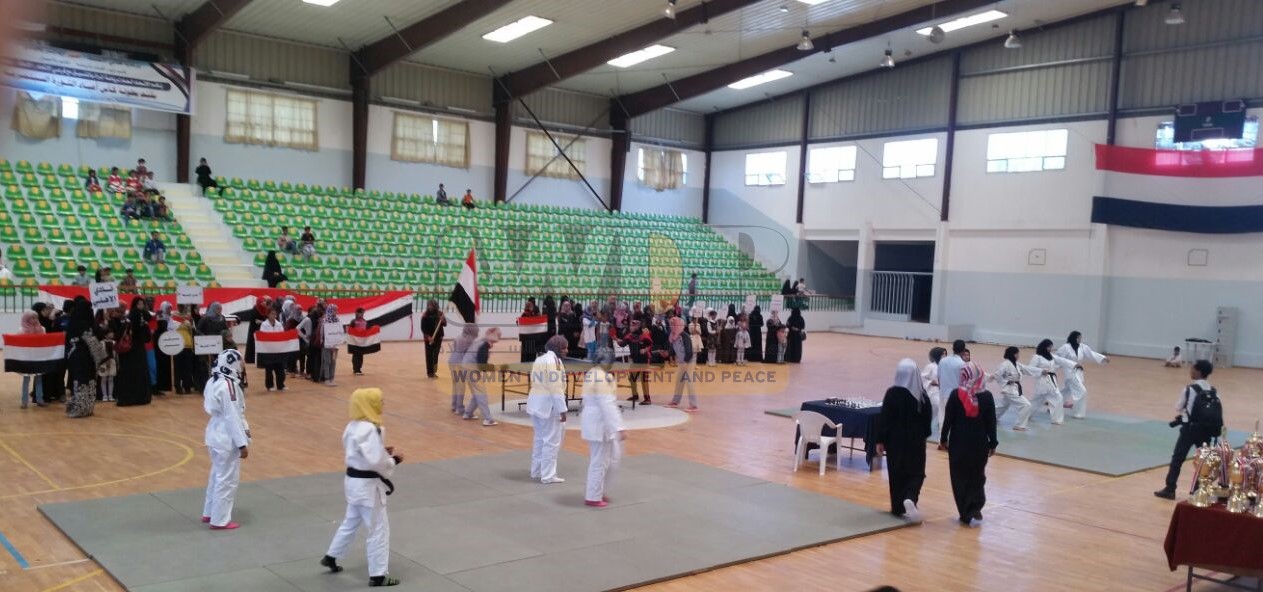Hanan Hussein – Women in Development and Peace
Amidst the escalating security situation in Yemen and the intensification of conflict and armed disputes, the sports sector has not been spared from the severe repercussions of these events. The participation of Yemeni women in various sports activities has notably declined across all levels.
The words of global leader Nelson Mandela, “Sport has the power to change the world, it has the power to inspire, it has the power to unite people in a way that little else does,” reflect the reality of Yemeni women who resist injustice through sports and set an example of determination and resilience in the face of adversity.
Importance of the Female Factor
Yemeni basketball player Noorhan Muhammad emphasizes the importance of women’s participation in sports, highlighting the numerous benefits it brings to both the individual and society as a whole, including health, psychological, social, economic, and developmental aspects.
She also points out that women’s achievements in sports are not confined to specific countries but are recognized globally, demonstrating their competence and efficiency in various sports fields. These achievements have also alleviated a considerable amount of unemployment, opened new opportunities, and provided for many families.

Sports journalist Samah Al-Dabhani comments on the subject, stating that the presence of women in sports is as important as in any other field. Women have been able to prove themselves in various capacities and have achieved international recognition in their presence.
She notes that women’s sports in Yemen began to emerge after the graduation of the first batch of female police officers in 2002, but it remained limited to specific sports such as shooting, equestrianism, judo, table tennis, basketball, and chess.
Captain Balqees Rafat, responsible for the women’s sector in the Yemeni Billiards and Snooker Federation, sees a pivotal role for women in the development of national sports. She believes that Yemeni women are no less capable than women around the world and are able to achieve success and excel in various sports fields.
She points out that Yemeni women suffer from a lack of moral and material support, which hinders their participation in sports and the realization of their full potential. She emphasizes the need for the Ministry of Youth and Sports, particularly the Yemeni Billiards and Snooker Federation, to provide suitable infrastructure and ensure equality between men and women in sports opportunities, support, and funding.
Negative Impact
Captain Nuha Al-Durra, an owner of a sports academy and a coach, confirms that the conflict has had a significant impact on the sports sector in Yemen, leading to a noticeable decline in club attendance, and prompting many athletes to migrate to other more lucrative fields. External championships have almost come to a halt, with the exception of a few held under very difficult circumstances.
Captain Balqees Rafat adds: “Before the conflict, Yemeni women practiced many sports such as billiards, basketball, volleyball, and chess, and women’s sports activities were very active. But with the onset of the conflict, these activities were greatly affected, especially billiards, which faced a deadly slump due to the marginalization of Yemeni women from championships, especially external ones.”
This is confirmed by player Noorhan, who says: “The conflict led to the closure of government clubs for women and their complete exclusion from both internal and external championships, whereas before the conflict, they participated in any sport they practiced.”
Judo player Reem Attiq also mentions that regular sports training took place before the conflict, with annual local championships and external participation in more than one sport and more than one country. However, the situation has changed for women’s sports, which she describes as completely paralyzed.
Challenges Facing Women Athletes
Captain Balqees states: “The biggest challenge facing women in the sports sector is that they are not allowed to participate in external championships without a mahram, which unfortunately poses a significant obstacle, as it is difficult for every player to take a mahram with them to compete in any external championship.”
From her side, Captain Nuha points out that there are conservative families that prevent their daughters from participating in sports, which is one of the customs and traditions that represent one of the most important challenges facing women’s sports in Yemen.
In the same context, Samah Al-Dabhani says: “Women’s sports were practiced in Yemen with very limited games and in closed halls away from the media, except for specific sports, but with the outbreak of several conflicts and social difficulties imposed by domination, a biased mindset has emerged, making women’s participation in sports nowadays catastrophic, with dire consequences and difficult implementation.”
Social Beliefs
Yemeni women in general face a narrow view of their participation in various sports games. Many families prevent their daughters from joining sports clubs, considering it foreign and alien to Yemeni customs and traditions. On the other hand, some support and encourage their daughters to engage in sports activities, in addition to the spread of several sports clubs in various Yemeni cities that aim to raise awareness about the importance of maintaining and losing weight and acquiring fitness.
In this context, journalist Samah Al-Dabhani believes that the conflict alone is not the reason and is not the only obstacle to the presence of Yemeni women in the sports field. Before the conflicts, the Yemeni tribal society, adhering to religious doctrines and customs, and traditions, did not allow the presence of women in sports activity clubs. Moreover, some Yemeni families do not support or encourage their daughters to participate in sports activities.
She says: “Unfortunately, the sports sector in Yemen has been and still is, to this day, largely monopolized by men, while women’s sports are neglected by the government and viewed narrowly by society.”
Captain Balqees sees the lack of total support from the relevant authorities as the biggest hurdle facing women in sports. Whenever they get the opportunity to compete in external championships, they have to do so at their own expense, including tickets, personal expenses, and accommodation during the championship, which usually does not exceed 10 days. This in itself is the height of hindrance and disrespect for Yemeni women.
Captain Nuha confirms that the role of official bodies is limited and barely noticeable, except for annual workshops that offer little return and few benefits.
Future Plans

Secretary-General of the Yemeni Association for Sports Media, Khalid Al-Nawari, sheds light on the current status of Yemeni women in the sports arena, saying: “Yemeni women are now recording a distinctive presence in some sports such as judo, with Arwa Ilyas recently participating in the Paris Olympics, and player Yasmin Al-Rimi participating in shooting competitions.”
He emphasized the importance of providing appropriate opportunities for women athletes to represent Yemen internationally, in line with their abilities and skills and their specific needs, and stressed the importance of encouraging and supporting them by all concerned parties in the future.
Al-Nawari added: “Real progress in the participation of Yemeni women in sports requires comprehensive future plans that focus on awareness and change from an early age. Schools are an ideal environment to plant the seeds of sports awareness among girls and contribute to changing the stereotypical view that restricts women’s participation in sports, enabling them to soar in the realms of creativity and success.”
Solutions and Treatments
Al-Dabhani clarified that the first step to empowering women is to pave the way for community awareness and enlightenment about the importance of women’s participation in sports, like any other field, to confront the stereotypical view that restricts their participation.
She emphasizes the necessity of governmental support for women athletes, providing facilities, access to high-level training and development programs, and the establishment of clubs and sports activities specifically for women, as well as opportunities and grants for internal and external participation, which is currently very limited.
Captain Balqees recommends giving women their due in the sports field by providing moral and material support from all relevant authorities to elevate Yemen’s name.
From her perspective, Captain Nuha Al-Dorra emphasizes the need to support physical education graduates, considering them the foundation for building a comprehensive sports sector. She advocates for material and moral support for players, encouraging them to develop their skills in various sports fields, and establishing a specialized union to protect the rights of Yemeni women athletes. Additionally, she highlights the importance of ensuring qualified players and coaches while excluding those who unqualified in the profession.
Shaima, a sports coach at a women’s club, offers practical suggestions to enhance women’s participation in Yemeni sports, including the establishment of clubs dedicated to walking and cycling in a safe and comfortable environment, and providing clubs exclusively for women to ride horses, among other sports that suit their needs and desires.
She emphasizes the importance of providing women with sports facilities in different areas for easy access, which would encourage them to join clubs and practice sports regularly to improve their physical fitness. She points out that women need all types of sports to empower them and maintain their health, calling for support for their participation in various sports fields.
The player Noorhan emphasizes by saying: “All solutions and treatments begin with enacting clear and serious laws to enhance women’s participation in Yemeni sports, safeguarding their rights and duties, ensuring the means of enforcing this law, and holding accountable anyone who tries to undermine it or manipulate it; as the law serves as the foundation to ensure a safe and fair environment for female athletes, enabling them to practice sports freely and achieve their full potential.”

